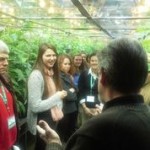The Rutgers Cooperative Extension offers the following tips for people doing work on their lawn and garden this spring. Bulbs: Start planting summer bulbs in May. Some favorites are gladiolus, dahlias, calla lilies, caladiums, alstroemeria, lilies, cro…
Archives for April 2014
NBC Hits Home On Climate Change Special
NBC aired an hour-long special on the effects of climate change, making bold connections to current extreme weather events and featuring several climate scientists. The network, which previously devoted scant coverage to climate change, is proving that…
Commence the firestorms
Since Rutgers chemistry professor Robert Boikess successfully urged faculty last month to oppose Condoleezza Rice as commencement speaker for her role in the Iraq war, he has been called “racist,” “liberal” – and worse. The selection of the former secretary of state has set off nothing short of a firestorm on campus with Boikess and his colleagues planning a “teach-in,” launching a website to build opposition, and filing a flurry of public records requests aimed at uncovering how Rice was invited…”It’s a polarizing, divisive issue,” said Ann Gould, a professor in the plant biology and pathology department. She chairs the university senate, which has commissioned a study in the wake of the controversy on how Rutgers selects its speaker.
It’s sneezing season: With pollen levels likely to be high this year, allergy sufferers prepare for the worst
Elise Waldman, of Linwood, lives her life, but her allergies don’t make it easy. Every day, all year long, Waldman takes the over-the-counter medication Zyrtec for her hay fever and allergy symptoms. She doesn’t open the windows at her home. Shoes are …
ReClam The Bay Seeking Volunteers in Brick
Rutgers Cooperative Extension (RCE), along with the volunteers in ReClam the Bay are inviting the public to their annual Open House for the ReClam The Bay and the Barnegat Bay Shellfish Restoration Program.
Scientist explains why the jet stream is slowing down
Dr. Jennifer Francis from Rutgers University was featured earlier this evening on NBC’s “Our Year of Extremes: Did Climate Change Hit Home?” Her name may not be familiar, but her work has been quoted on KSDK many times. Dr. Francis has been able to show that the jet stream is slowing down which, in turn, has made significant contributions to events like the record heat and drought across North America two years ago and the cold weather we had this past winter…Francis is among the vast majority of climate scientists worldwide, including those from the United Nations Intergovernmental Panel on Climate Change whose report was released last week along with a stern warning to all nations that the time to respond to global warming is running out.
NJ 4-H’ers Engage in Agricultural Science Innovation at National Youth Agri-Science Summit
Fifteen New Jersey 4-H members from Burlington, Cumberland and Mercer counties joined youth and adult teams from across the U.S. at the National Youth Agri-Science Summit, January 16-20 at the National 4-H Youth Conference Center in Chevy Chase, Maryland. The high school students learned about agricultural science and technologies through a variety of hands-on activities, […]
Never a Dull Moment: Palmer LTER scientists still encounter surprises after 22 years of observations
Even after more than two decades of monitoring one of the fastest changing regions on the planet, researchers with the Palmer Long Term Ecological Research (LTER) External Non-U.S. government site program can still encounter a few surprises. Ironically, one of those surprises involved the presence of sea ice across the western side of the Antarctic Peninsula, a region experiencing some of the most dramatic climate changes on the planet…”The very late sea ice retreat likely triggered this humongous bloom. Our job now is to figure out how,” noted Oscar Schofield External Non-U.S. government site, chief scientist on the cruise from Rutgers University.
City Birds and Plants in Decline
Most bird and plant species in cities are native to those areas, but their numbers are rapidly decreasing around the world. Myla Aronson at Rutgers University in New Brunswick, New Jersey, and her colleagues compiled and analysed data for birds in 54 c…
Arctic Warming Theory So Cutting Edge, It’s Hard to Prove
Last September, a group of scientists gathered to review the evidence on a new hypothesis: that the rapid warming of the Arctic was causing the jet stream to meander, leading weather systems to become “stuck” in places farther south, like over the United States and Europe. For example, a heat wave caught in a slow-moving, kinked-up jet stream might linger over a city like Chicago for days. Or a storm system could stall over Europe, dumping excess rain and leading to floods…At the meeting, proponents of the hypothesis, including its originators and supporters – researchers like Rutgers’ Jennifer Francis and the National Oceanic and Atmospheric Administration’s James Overland – presented data on how they believe a warming Arctic is affecting lower-latitude weather. Other scientists, in turn, presented evidence from model studies and statistical tests showing no such linkage.


